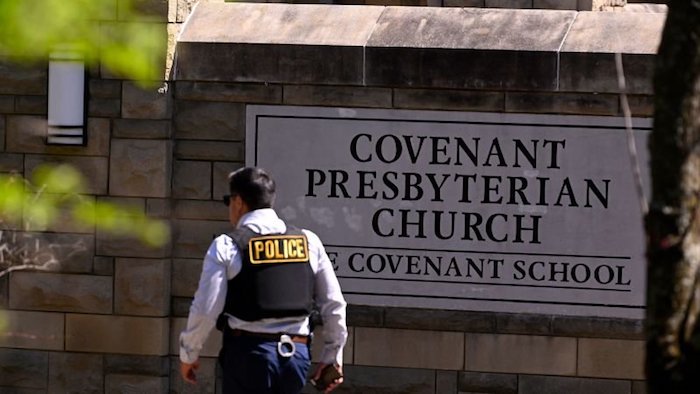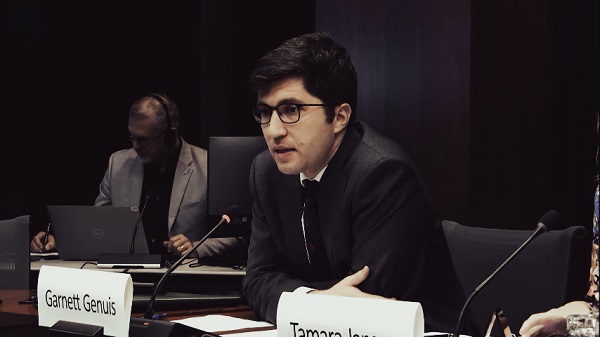Crime
Nashville school shooter’s ‘manifesto’ highlights the destructive nature of porn, sexual confusion

From LifeSiteNews
The disjointed ramblings of gender-confused school shooter Audrey Hale reveal her deep obsession with gender and race, with many disturbing entries centering on aggressive and sexual behaviours.
On June 10 and June 14, I reported on leaked sections of the so-called “manifesto” of Audrey Hale, the trans-identified school shooter who killed three 9-year-old children and three adults at Covenant Christian School on March 27, 2023, in Nashville, Tennessee. LGBT groups had called for the suppression of Hale’s writings immediately after the murders for fear that (another) transgender shooter would have some politically inconvenient things to say. The press and the police largely cooperated, with the exception of several leaks earlier this year.
Those leaks included photos of Hale’s journals, in which she wrote of her hatred for her Christian parents, her desire for puberty blockers, and her fervent hope for a “high death count” when she started shooting those “white privileged crackers.” In the second leak, including pages published by Matt Walsh of The Daily Wire, Hale fantasized about having a male body and sodomizing girls, and attacked Christians as transphobic bigots. Some phrases and numbers were difficult to decipher or decode.
READ: Full 90 pages of Nashville shooter’s ‘manifesto’ reveal obsession with gender confusion, suicide
Now, The Tennessee Star has published the full, unredacted “manifesto” of Audrey Hale (who refers to herself throughout the notebook as “Aiden,” her transgender identity). It is about 90 pages and is not so much a “manifesto” as a series of disjointed ramblings, much of it sounding like it was written by someone tormented by unrequited love; most of it is sexual and obsessive. Combine that with Hale’s gender dysphoria and this Christian school girl turned transgender terrorist was clearly a deeply disturbed and angry person.
I spent some time reading through all of Hale’s writing and found much of it incoherent. At one point, she writes, “This love will never end until I am up in heaven where hurt is no more and I can love you and be in no more pain,” appearing to refer to a breakup. Shortly thereafter: “Everything hurts.” The name “Syd” shows up frequently; these letters are apparently to or about Hale’s friend Sydney Sims, who died in a car accident in 2022. Hale was clearly infatuated by her. Comments referring to her transgender identity are throughout the notebook:
“I am a boy with a vagina.”
“Audrey is not my name.”
“A terrible feeling to know I am nothing of the gender I was born of.”
“I am the most unhappy boy alive.”
“I will be of no use of love for any girl if I don’t have what they need: Boy’s body/male gender.”
“If God won’t give me a boy body in Heaven,” followed by a blasphemous declaration.
“Why does my brain not work? Because I was born wrong!”
“I hate society b/c society ignores to see me. I’m a queer; I am meant to die.”
She had apparently been planning her school shooting for some time. On January 16, 2023, she wrote, “I’m so sorry Nikki. I didn’t mean to plan my massacre on the 17th. I’m going to be a terrible s**t for leaving you. How bad my heart hurts. Tomorrow is my last day on earth. I love you. I am so sorry. Audrey (Aiden).” Underneath, she scribbled: “Ps—Not leaving yet. I couldn’t do it. I don’t want to ruin your day. I’ll wait as planned.”
Two pages later: “Paige, I’m going to kill people someday. Please don’t be mad … I’m going to do something bad. It’s too sad to think what you might feel. I’m so sorry. I love you. I just have to die. I think God will enter me in heaven. If I do get there I’ll be waiting for you. Aiden.”
Paige Patton was one of Hale’s friends. Hale messaged her the day of the shooting saying that she would die that day; Patton alerted the authorities, but they didn’t respond to her until after the shooting.
“So now, in America, it makes one a criminal to have a gun or be transgender or non-binary,” Hale wrote on another page. On the opposite page, a chilling note: “Covenant was closed yesterday. I guess it was b/c of the weather … 2/18/23.” Several pages later: “In less than 26 days, my final day, Death Day, will finally await me. 3/27/23.” On March 13, after packing several pages with grotesque, clearly porn-inspired sexual fantasies: “I’m sorry innocent lives will be taken.” In a reference to the Columbine shooters: “I want my massacre to end in a way that Eric (Harris) + Dylan (Klebold) would be proud of.”
The final page was written on the day of the massacre. “Forgive me God, this act will be inglorious,” she wrote.
Death Day! Today is the day. The day has finally come! I can’t believe it’s here. Don’t know how I was able to get this far, but here I am. I’m a little nervous, but excited too. Been excited for two weeks. There were several times I could have been caught, especially back in the summer of 2021. None of that matters now. I’m almost an hour and 7 minutes away. Can’t believe I’m doing this, but I’m ready … I hope my victims aren’t. My only fear is if anything goes wrong … God let my wrath take over my anxiety. It might be 10 minutes tops. It might be 3-7. It’s gunna go quick. I hope I have a high death count. Ready to die haha.
It was signed “Aiden.”
Shortly after writing those words, 28-year-old Audrey Hale entered The Covenant Christian School with two AR-style weapons and a handgun, shooting open a locked side door to gain access. She began her shooting spree at around 10:13 a.m., killing three 9-year-old children – Evelyn Dieckhaus, Hallie Scruggs, and William Kinney – and three adults – 61-year-old substitute teacher Cynthia Peak, 60-year-old principal Dr. Katherine Koonce, and 61-year-old custodian Mike Hill. Less than 15 minutes later, Hale was shot and killed by two police officers.
Courageous Discourse
No Exit Wound – EITHER there was a very public “miracle” OR Charlie Kirk’s murder is not as it appears

By John Leake
Turning Point Spokesman: “No Exit Wound a Miracle”
Charlie Kirk Show producer Andrew Kolvet repeats extremely dubious claim purportedly made by “the surgeon who operated on Kirk.”
Monday Blaze Media (relatable with Allie Beth Stuckey) reported the following:
Turning Point USA spokesman and executive producer of the “Charlie Kirk Show” Andrew Kolvet revealed new details about the shooting that even doctors are calling a miracle. According to Kolvet, the surgeon who operated on Kirk claimed that the high-velocity bullet was powerful enough to kill multiple large animals — and “should have gone through” his body. But for some reason, Kirk’s body was able to stop it.
“I want to address some of the discussion about the lack of an exit wound with Charlie,” Kolvet wrote in a post on X.
“The fact that there wasn’t an exit wound is probably another miracle, and I want people to know,” Kolvet continued, explaining that he had spoken with the surgeon who worked on Charlie in the hospital.
“He said the bullet ‘absolutely should have gone through, which is very very normal for a high powered, high velocity round. I’ve seen wounds from this caliber many times and they always just go through everything. This would have taken a moose or two down, an elk, etc,’” he recalled.
“But it didn’t go through. Charlie’s body stopped it,” he added.
When he mentioned to the doctor that there were “dozens of staff, students, and special guests standing directly behind Charlie” when he was shot, the doctor reportedly replied, “It was an absolute miracle that someone else didn’t get killed.”
“His bone was so healthy and the density was so so impressive that he’s like the man of steel,” Kolvet recalls the doctor saying.
This is not a credible statement, and it raises a number of concerns.
It strikes me as very perplexing that a “surgeon operated on Kirk,” because in the video of the shooting, Charlie reacted with a decorticate posture—that is, an abnormal body posture characterized by flexion of the upper limbs—caused by severe trauma to the central nervous system. This indicates that the bullet either directly struck his cervical spinal cord, or the shock wave of the supersonic bullet passing near his spinal cord traumatized it.
A 150-grain, .30-06 bullet’s energy at 150 yards from the muzzle varies by ammunition, but a common hunting cartridge has an estimated value of approximately 1,800-2,000 foot-pounds (with the bullet traveling at about 2500 feet per second). In other words, the .30 caliber (.30 inch diameter) metal projectile struck his neck with sufficient kinetic energy to move a 2,000 pound mass a linear distance of one foot.
If the bullet that struck Charlie’s cervical spinal cord was a .30-06 fired from 150 yards away, it would have:
1). Severed his spinal cord, killing him instantly.
2). Passed through his neck.
Note that the cervical vertebrae are supported by strong muscles and have high compressive strength, but are far too delicate to stop a .30-06 bullet traveling at 2,500 feet per second.
If ALL of the kinetic energy of the bullet was absorbed by Charlie’s neck, it would have done spectacular trauma to his neck, as distinct from producing the clean bullet hole visible in the video footage that ruptured his Carotid artery.
Though I appreciate that some may find a supernatural explanation to be consoling, it seems to me that the investigation should not rest on the this explanation.
As I wrote a few weeks ago: If I were investigating the murder, I would consider the hypothesis that Charlie was shot with a weapon equipped with a suppressor and loaded with a subsonic cartridge to further reduce the sound. I have seen footage of someone firing a rifle with this setup, and the shot was amazingly quiet. The effective range of such a weapon is about 100 yards or less, and the shooter must be very skilled.
However, such a setup could fire a subsonic projectile that would penetrate a human neck without passing through it. In this scenario, the actual assassin (firing the suppressed rifle) hypothetically coordinated the timing of his shot with someone else firing a normal (supersonic and loud) rifle cartridge into the air at the same time to create a distraction or red herring.
In a functioning society in which the people trust their authorities—including their medical examiners—it would be easy to discover what happened and to disclose at least a preliminary report that would satisfy most reasonable people. The trouble our Republic is facing now is that so many of us no longer trust our federal and state authorities to tell us the truth.
For example, we have strong grounds for suspecting that medical examiners are not diligently investigating (with the proper analytic methods) unexpected, fatal cardiac arrests in young people to determine if they were caused by vaccine-induced myocarditis.
Subscribe to FOCAL POINTS (Courageous Discourse).
For the full experience, upgrade your subscription.
Business
Quebecers want feds to focus on illegal gun smuggling not gun confiscation

The Canadian Taxpayers Federation released new Leger polling showing that half of Quebecers say the most effective way to reduce gun crime is to crack down on illegal gun smuggling from the United States, not a federal gun ban and confiscation.
“Law enforcement experts say the best way to make Canada safer is to stop illegal gun smuggling and Quebecers say exactly the same thing,” said Nicolas Gagnon, CTF Quebec Director. “It makes no sense to pour hundreds of millions into a confiscation that only takes guns from lawfully licensed gun owners.”
In 2020, the federal government launched its policy to confiscate thousands of so-called “assault-style” firearms from licensed gun owners. Ottawa recently announced a pilot project in Cape Breton to start taking firearms from individual owners.
The Leger poll asked Quebecers what they think is the most effective way to reduce gun crime. Results of the poll show:
- 51 per cent say introducing tougher measures to stop the illegal smuggling of guns into Canada from the United States
- 37 per cent say banning the sale and ownership of many different makes and models of guns along with a government buyback program
- Six per cent say neither of these options
- Seven per cent do not know
The results of the polls arrived as recorded remarks from Public Safety Minister Gary Anandasangaree made headlines in September.
In a leaked audio recording, the minister suggested the confiscation program is being pushed in part because of voters in Quebec, while also expressing doubt that local police services have the resources to enforce it.
Police organizations have long warned Ottawa’s confiscation program is misguided. The RCMP union says it “diverts extremely important personnel, resources, and funding away from addressing the more immediate and growing threat of criminal use of illegal firearms.”
The program was first estimated to cost $200 million. Just providing compensation for the banned guns, not including administrative costs, could cost up to $756 million, according to the Parliamentary Budget Officer.
Premiers of Alberta and Saskatchewan have both publicly said that they would not cooperate with Ottawa’s gun ban. Premier François Legault has stayed silent on this issue.
“Quebecers have been clear: the real problem is illegal gun smuggling, not law-abiding firearms owners,” said Gagnon. “The police have also made it clear the gun confiscation will waste money that could be used to stop criminals from committing gun crimes.
“Legault needs to stand up for Quebec taxpayers and refuse to help implement Ottawa’s costly and ineffective confiscation scheme. The federal government needs to drop this plan and focus its resources on intercepting illegal guns at the border: that’s how you actually make communities safer.”
-

 Business1 day ago
Business1 day agoEmission regulations harm Canadians in exchange for no environmental benefit
-

 Courageous Discourse1 day ago
Courageous Discourse1 day agoNo Exit Wound – EITHER there was a very public “miracle” OR Charlie Kirk’s murder is not as it appears
-

 Business1 day ago
Business1 day agoQuebecers want feds to focus on illegal gun smuggling not gun confiscation
-

 Alberta1 day ago
Alberta1 day agoPetition threatens independent school funding in Alberta
-

 National1 day ago
National1 day agoPolitically Connected Canadian Weed Sellers Push Back in B.C. Court, Seek Distance from Convicted Heroin Trafficker
-

 Business1 day ago
Business1 day agoCanada Revenue Agency found a way to hit “Worse Than Rock Bottom”
-

 Censorship Industrial Complex1 day ago
Censorship Industrial Complex1 day agoWho tries to silence free speech? Apparently who ever is in power.
-

 Automotive1 day ago
Automotive1 day agoParliament Forces Liberals to Release Stellantis Contracts After $15-Billion Gamble Blows Up In Taxpayer Faces










